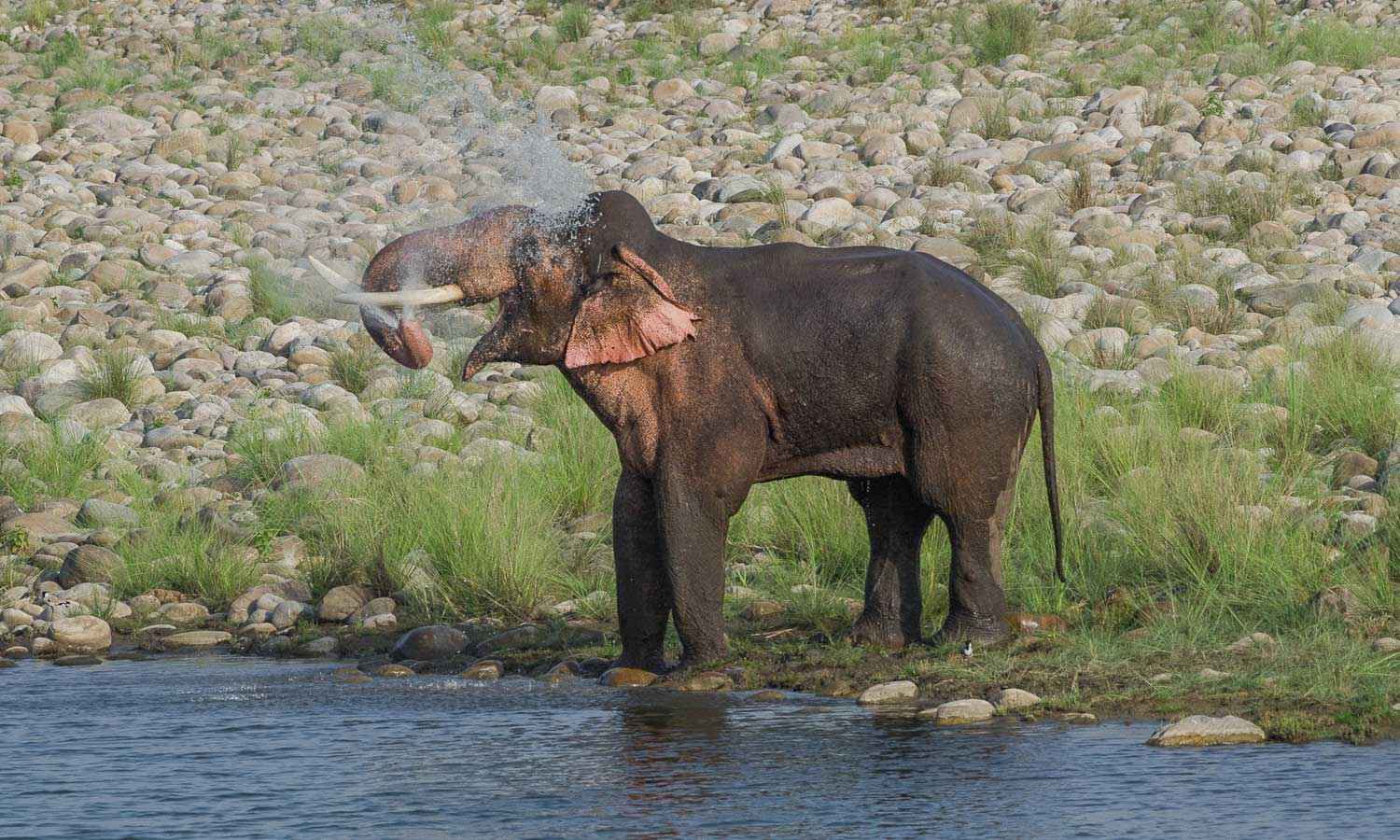Explore Dudhwa National Park: North India's Unique Terai Wilderness
Nestled in the northern state of Uttar Pradesh, along the Indo-Nepal border in the Lakhimpur Kheri district, Dudhwa National Park is a crucial component of the larger Dudhwa Tiger Reserve (DTR). This verdant and often misty wilderness, characterised by expansive marshy grasslands (savannahs), dense Saal forests, and meandering rivers, represents the last significant remnant of the highly productive Terai ecosystem in India. Dudhwa is globally recognised for its exceptional conservation achievements, including the successful reintroduction of the one-horned rhinoceros and being the last natural stronghold for over half of the world's population of the critically endangered hard-ground Barasingha (swamp deer).
A Legacy Forged in Conservation
Dudhwa's journey to becoming a vital conservation area began in 1958, officially declared a National Park in 1977. A significant milestone occurred in 1987 when Dudhwa, along with adjacent sanctuaries, formed the Dudhwa Tiger Reserve (DTR) under Project Tiger. One of its most remarkable achievements is the Rhino Rehabilitation Project, initiated in 1984, which successfully reintroduced Indian One-horned Rhinos that were once native to the region. The pioneering efforts of conservationists like Kunwar 'Billy' Arjan Singh were central to protecting Dudhwa's tigers and establishing its reputation as a crucial biodiversity hotspot.
The Vibrant Ecosystem of Dudhwa
Dudhwa National Park is a biodiverse haven, representative of the rich Terai-Bhabar ecosystem at the foothills of the Himalayas. The park's landscape is a mosaic of dense Sal forests, vast marshy grasslands, and life-giving rivers and wetlands.
Dudhwa's Star Wildlife Attractions:
Bengal Tiger (Panthera tigris tigris): Dudhwa is a stronghold for the tiger, with good opportunities for sightings in its grasslands and forests.Indian One-horned Rhinoceros (Rhinoceros unicornis): Witness the success of the Rhino Rehabilitation Project with a thriving population in a dedicated zone.
Barasingha (Rucervus duvaucelii): The park is the last global stronghold for the hard-ground swamp deer, holding over half the world's population.
Asiatic Elephant (Elephas maximus): Large herds of elephants roam freely across the Terai landscape.
Five Deer Species: A unique feature of Dudhwa is the presence of five deer species: Swamp Deer, Sambar, Chital (Spotted Deer), Hog Deer, and Barking Deer.
Other significant wildlife species include:
Leopard, Sloth Bear, Wild Boar, Nilgai, and the elusive Hispid Hare.
Avian Paradise:
A true paradise for birdwatchers, Dudhwa boasts over 450 species of birds. Notable sightings include the critically endangered Bengal Florican, the Great Slaty Woodpecker, Swamp Francolin, various hornbills, fishing eagles, storks, and the majestic Sarus Crane.
Reptiles:
The park's rivers and wetlands are home to both Mugger Crocodiles and the long-snouted Gharials. Various species of snakes, including pythons and monitor lizards, also inhabit the park.
Best Time to Visit
The park's core zones are generally open from November 15th to June 15th. Always confirm the official park calendar before planning your trip.
November to February (Winter):
This is an excellent time for a comfortable safari experience with pleasant weather. The post-monsoon landscapes are vibrantly green, and this season is fantastic for birdwatching as numerous resident and migratory species flock to the wetlands.
March to June (Summer):
This period offers the highest probability for tiger, rhino, and elephant sightings. As water sources dwindle, animals congregate around the remaining lakes and rivers, making them easier to spot. The sparse vegetation also improves visibility.
Safari Zones at Dudhwa
The Dudhwa Tiger Reserve offers several tourism zones, each with unique highlights.
Dudhwa Zone: The core area, renowned for its grasslands, Sal forests, and high density of Barasingha. Good for tiger and elephant sightings. The Sonaripur area is particularly famous for the Rhino Rehabilitation Area, offering a high chance of seeing the Indian One-horned Rhinoceros.Kishanpur Wildlife Sanctuary: Known for excellent birdwatching around Jhadi Tal and good tiger sightings.
Katarniaghat Wildlife Sanctuary: Renowned for its unique boat safaris on the Girwa River to spot Gharials and Gangetic Dolphins.
Safari Options at Dudhwa
Dudhwa offers diverse safari experiences for a thrilling journey into its wilderness. We organise all safari options with our expert team of Naturalists.
Jeep Safari: The primary way to explore all zones. Open-top 4x4 Jeeps take you deep into the park for thrilling wildlife encounters. Pre-booking is highly recommended.
Elephant Safari: When available, this traditional safari offers a unique high vantage point for exploring marshy areas that are inaccessible to jeeps, ideal for spotting rhinos and Barasingha.
Boat Safari: A highlight in the Katarniaghat Wildlife Sanctuary. A serene boat ride on the Girwa River offers excellent opportunities to spot gharials, mugger crocodiles, Gangetic dolphins, and diverse riverine birds.
How to Reach Dudhwa
By Air:
Lucknow Airport (LKO): The nearest major airport, approximately 240 km (4-5 hours drive) from Dudhwa. It is well-connected to all major Indian cities.Pantnagar Airport (PGH): Closer in distance (approx. 180 km) but with limited flight connectivity.
By Rail:
Palia Kalan (PLA) & Dudhwa (DDW): The closest railway stations (4-10 km from the park) with limited connectivity.Lucknow Railway Station (LKO): The most convenient major railhead with excellent connectivity. From Lucknow, you can hire a taxi for the 4-5 hour drive to the park.
By Road:
Dudhwa is well-connected by road. It's a comfortable 4-5 hour drive from Lucknow and about an 8-9 hour drive from Delhi. Private taxis and buses are available from major nearby cities like Lucknow and Bareilly.
Conservation Efforts at Dudhwa
Dudhwa is a testament to dedicated conservation. The successful Rhino Rehabilitation Project and the remarkable recovery of the Barasingha population are landmark achievements. As part of Project Tiger, the reserve implements rigorous anti-poaching strategies, habitat management of its crucial grasslands and wetlands, and community engagement programs to mitigate human-wildlife conflict. Maintaining transboundary wildlife corridors with Nepal is also critical for the long-term viability of its tiger and rhino populations.
Additional Activities & Nearby Attractions
Beyond wildlife safaris, visitors can explore the unique culture of the indigenous Tharu tribe in nearby villages, experiencing their traditional lifestyle and handicrafts. The region is a paradise for serious birdwatchers, with dedicated trails and hotspots. A day trip to Kishanpur or Katarniaghat sanctuaries offers a change of scenery and unique wildlife viewing opportunities that complement the Dudhwa experience.
Dudhwa National Park offers an unparalleled opportunity to experience North India's unique Terai wilderness, with its remarkable conservation stories and thrilling encounters with its iconic wildlife. Book your Dudhwa safari with Tigerwalah today. Simply fill out the form to check availability, get pricing details and secure your spot in this incredible wilderness.
Get In Touch
Ready for an adventure? We're here to help.












